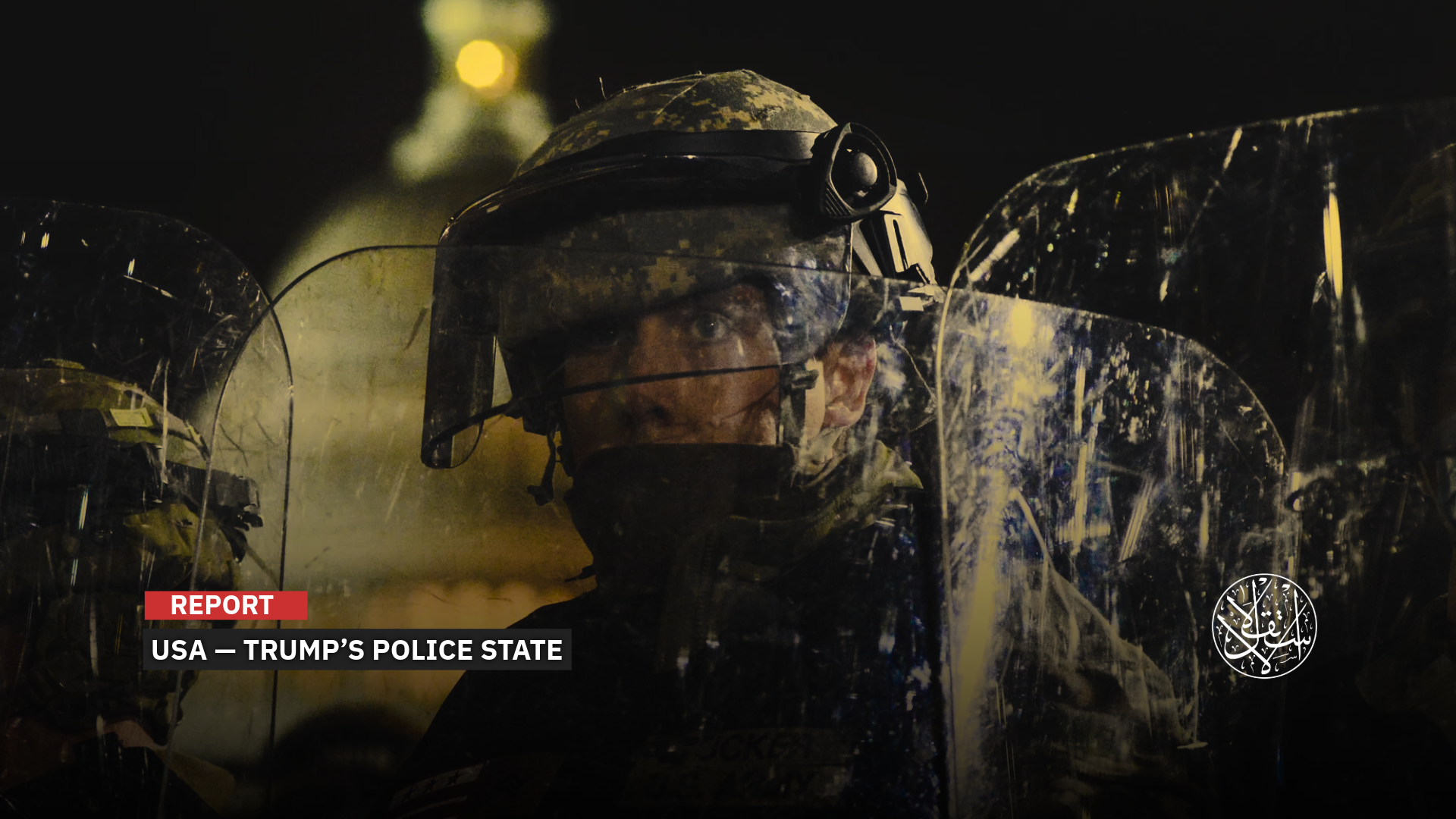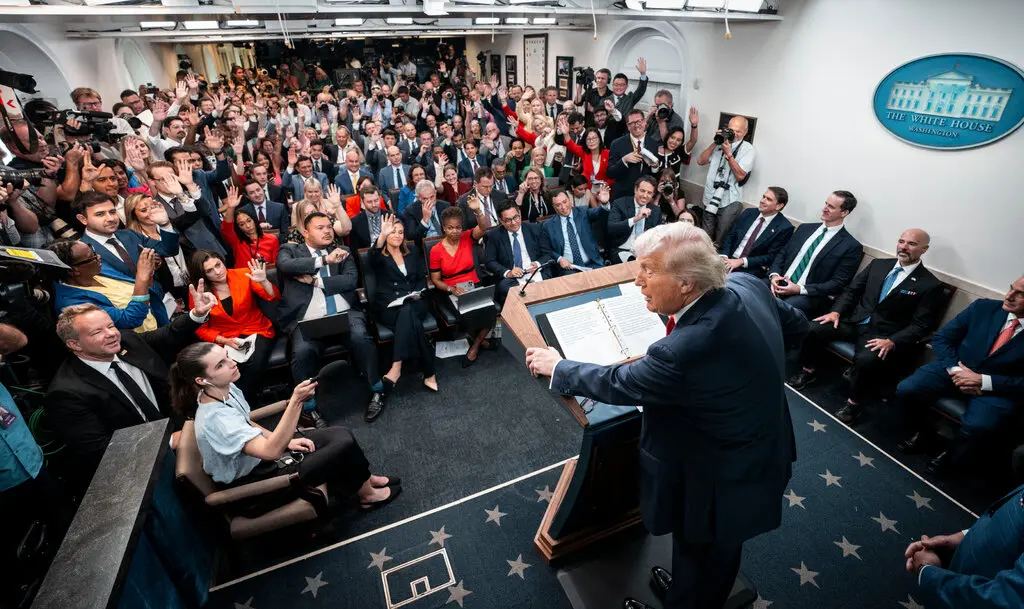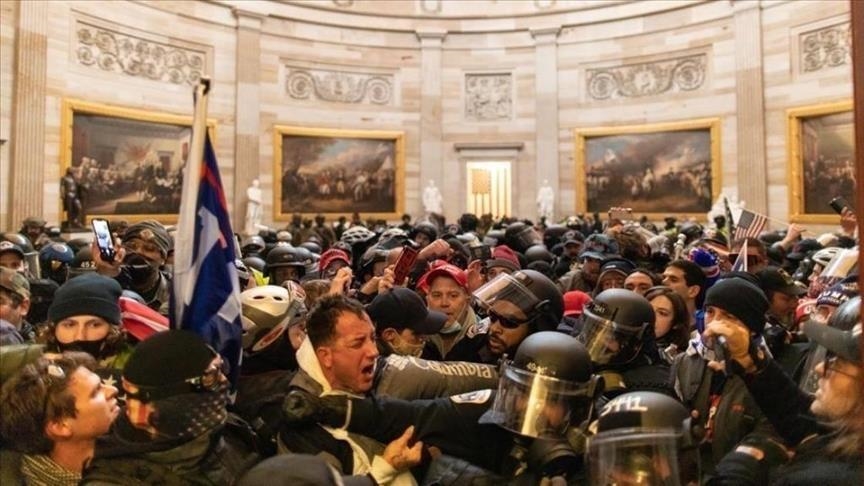‘A Police State’: Why Did Trump Deploy Military Forces in Washington?

What’s happening is a bold plan to turn the United States into a police state.
Is President Donald Trump plotting to turn the United States into a police state? Or is he staging a crisis of distraction and spectacle to justify a sweeping expansion of his powers?
These questions have gained traction in the United States following Trump’s orders to deploy the National Guard in Washington and place the police under their command, citing the need to fight crime.
Lawmakers, legal experts, and human rights organizations have voiced concern over the expanded role of the military in domestic affairs, warning that Trump could use the same approach to exert control over other states whose Democratic governors defy his orders.
Media outlets said his decision to deploy the National Guard in the capital marked a bold step toward turning the United States into a police state, expanding the use of military force on American soil.

On the Brink of a Clash?
In a controversial move, Trump, on August 8, 2025, announced that the Washington police would be placed under direct federal supervision. This was his second major intervention after ordering the National Guard into Los Angeles in June 2025 to act against immigrants.
He deployed National Guard troops to the capital, justifying the action as necessary to confront “violent gangs and bloodthirsty criminals.”
The National Guard is a reserve military force of the U.S. Army, divided into two branches: one under the Army and the other under the Air Force. Its personnel equal half of the U.S. armed forces, and its equipment amounts to one-third of what the Army possesses.
These troops can be mobilized and deployed on the streets by the president to support the nation’s military.
The president wields broad authority over the 2,700 National Guard members in Washington, unlike in the states, where governors typically hold the power to deploy troops.
On August 11, Trump said he would place the Washington police under federal control and order the National Guard to patrol the city to address what he called a wave of lawlessness.
“It’s becoming a situation of complete and total lawlessness,” he told reporters at the White House.
This came despite statistics showing that violent crime in Washington dropped 35% in 2024, according to federal data, and fell by a further 26% in the first seven months of 2025, city police reported.
Trump claimed his control over the city was authorized under a rare provision of the 1973 law, which grants residents of the capital self-governance while allowing the president to assume command of the police in emergencies.
Tensions had initially remained low after interim mayor Muriel Bowser expressed her compliance with Trump’s executive order, seeking to avoid conflict while maintaining local oversight of police and city operations.
However, later actions by the Trump administration and Attorney General Pam Bondi escalated tensions, triggering the first serious confrontation. Bondi, appointed by Trump to oversee the city police, expanded her authority by appointing an emergency commissioner.
She then transferred police chief powers to the head of the Federal Drug Enforcement Administration, Terry Cole.
She also announced a halt to local policies limiting police cooperation with federal immigration enforcement, provoking anger and escalation from the city administration.
To curb Trump’s excesses, Washington, D.C., filed a lawsuit on August 15, 2025, seeking to block his control over the city police.
American media framed this as the start of a real confrontation, with the city’s Democratic-controlled authorities labeling the president’s actions as an overreach of his powers.
Washington’s Attorney General, Brian Schwalb, who filed the lawsuit, described these unprecedented actions by the Trump administration as far exceeding the limited authority granted to him and seeking to seize and encroach upon local police forces.
Trump’s plan relies on a provision in U.S. law that allows the commander-in-chief of the armed forces to bypass restrictions on domestic military use.
The administration is invoking the “DC Home Rule” law passed by Congress in 1973, which grants the president temporary control over the city police for 30 days.
Joseph Nunn, counsel in the Brennan Center's Liberty and National Security Program, said the Trump administration is relying on a fragile legal theory that the president can act broadly to protect federal property and operations.
During the first seven months of his second term, Trump oversaw the deployment of roughly 20,000 federal troops across the United States, including members of the National Guard, Army, Navy, Air Force, and Marines, according to the Pentagon.
In June 2025, Trump deployed National Guard forces to Los Angeles, sending 5,000 troops to confront protests against his administration’s crackdown on immigrants. State and local officials criticized the move, calling it unnecessary and provocative.

Police State?
Decisions by Trump and the Attorney General prompted U.S. newspapers to describe his actions as a military coup, an expansion of the army’s role, and a move toward turning America into a police state.
The Wall Street Journal strongly criticized the deployment of military forces for domestic policing, calling it Trump’s “boldest move to date to expand the use of military power on U.S. soil.”
It said the move sparked intense legal debate over the growing military presence in domestic matters.
“The most benign interpretation is that this is an attempt to gain a public-relations victory by claiming credit for the already historically low crime rates in D.C.,” said Carrie Lee, a senior fellow at the German Marshall Fund and a former professor at the U.S. Army War College. “The worst-case interpretation is that it is a test run for more legally dubious uses of military forces in other American cities,” She told the Journal.
The analysis noted that the Posse Comitatus Act generally prohibits using the army for domestic law enforcement except in rare, legally sanctioned cases.
But during his second term, Trump deployed the National Guard and military on several occasions, including sending Marines and National Guard troops to Los Angeles to confront protests against immigrant arrests and using military aircraft to transport detainees out of the country.
Under the headline “Trump’s Trial Run for a Police State,” criminal justice journalist Radley Balko described the president’s move as testing the limits of his authority.
In his article for The Intercept on August 11, 2025, Balko said it poses a direct threat to American democracy and signals the creation of a police state.
He argued that Trump’s actions are not a genuine response to rising crime rates but an attempt to intimidate opponents, suppress protests, and assert centralized control over cities led by Democratic officials.
Balko warned that a militarized police state is a system where law enforcement and the armed forces are used to suppress civil liberties and control populations through force and intimidation, threatening fundamental freedoms and democracy.
The Atlantic, on August 11, referred to “the president’s police state,” noting that “Trump is delivering the authoritarian government his party once warned about.”
It highlighted that “throughout his two presidencies, Trump has treated the military as a prop for making statements about which issues he cares about—and which he doesn’t.”
On August 16, The Philadelphia Inquirer Editorial Board described Trump’s takeover of Washington police as “part of the authoritarian playbook that also distracts from the real problems and profiteering taking place.”
It called Trump’s handling of federal authority “another dictatorial step toward turning America into a police state” and “an abuse of power and waste of taxpayer money to feed his strongman fantasies.”
The Hill said Trump’s plan showed his authoritarian ambitions taking shape by turning the National Guard in Washington into a police state.
It noted that he had achieved nothing in his second term and was attempting to use federal police and military forces against Black mayors in Democratic cities.
The article added that Trump’s seizure of federal power in Washington stemmed from his obsession with authoritarianism and spreading toxic lies about non-white people.
It also referenced Trump’s threats to arrest the Democratic (Muslim) candidate for New York mayor, Zehran Madani, warning that such behavior would likely continue.
Another report from The Hill cited concerns from Democratic politicians and civil rights groups over Trump’s political display of force, saying he intended to use the military against civilians, reflecting authoritarian tendencies and abuse of power.
The New York Times (NYT) suggested that Trump’s actions resembled a military coup, replacing police with military or paramilitary forces.
It questioned whether this was an attempt to assert control over the country, cover up the Jeffrey Epstein scandal, or deflect from poor economic performance and failure to end wars in Ukraine and Gaza.
“If we want to look at marauding mobs, look at Jan. 6,” said Mary McCord, the director of the Institute for Constitutional Advocacy and Protection at Georgetown Law and a former federal prosecutor. “If you want to look at criminal mobs, we had a criminal mob and he [Trump] called them peaceful protesters,” she told NYT.
During that event, clashes between security forces and Trump supporters who stormed the U.S. Capitol left four dead and 52 arrested.
The assault, a serious precedent in U.S. political life, occurred as Congress was certifying the presidential election results, confirming Joe Biden and Kamala Harris as president and vice president.
Trump’s deployment of National Guard forces in multiple states, along with his proposal to form a “rapid response force” for civil unrest, also drew broad criticism from officials, lawmakers, and leading newspapers.
“President Trump’s ever-expanding use of the military for domestic matters is beyond alarming. I have always supported strong law enforcement in our communities, but this National Guard deployment and federalization of city police is misguided and unsupported by the facts,” said Jack Reed, the senior United States senator from Rhode Island.
“Our military is trained to defend the nation from external threats and assist communities during disasters or emergencies, not to conduct day-to-day domestic policing. This deployment is a serious misuse of the National Guard’s time and talent.”
Sources
- Trump’s Trial Run for a Police State
- How Trump Is Expanding the Role of the American Military on U.S. Soil
- Trump’s autocratic dreams come true as National Guard turns DC into a police state
- The President’s Police State
- Trump takes another dictatorial step toward turning America into a police state | Editorial
- Trump Pulls Military Into Another Political Issue
- Trump takes over DC police in extraordinary move, deploys National Guard in capital
- Trump Deploys National Guard for D.C. Crime but Called Jan. 6 Rioters ‘Very Special’










